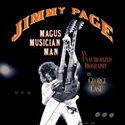
Jimmy Page: Magus, Musician, Man
by George Case
Backbeat Books
By any acceptable standard, James Patrick Page is one of the most influential musicians of the post-World War II era, and a recent book by Canadian author George Case puts some polish to his sterling legacy. Jimmy Page: Magus, Musician, Man marks the first time that he has been subject to full-length biographical treatment; this is only the first among hundreds of remarkable facts dispersed through its ten chapters.
This new paperback edition was revised and extended from the original 2007 hardback. It is not only a fun and useful read for fans of Page and Led Zeppelin, but it also provides quality insight into the guiding aesthetics of their time. Case paints a vivid picture of the 1960s British music scene, which delivered a veritable plethora of instrumental masters in rather quick succession. Theirs was a legacy matched only, perhaps, by the explosion of talent from New York during the Swing Era. Even the jazz, blues, and rock n’ roll icons who inspired them didn’t arrive on the scene at such a rapid pace, nor was their rise given the same instantaneous commercial reception as the so-called “British Invasion.”
Like his peers, Page was a child of World War II. He was born in 1944 – two years too early to be called, technically, a Baby Boomer, but built of similar materials. He was born into a Britain that was then fighting an existential struggle against a Nazi regime that had, by that point, been regularly bombing British civilians for four years. He was born into fire, fear, darkness, and death. Not only was he not destroyed by it, but he would become one of its greatest exponents in modern times.
Besides being the first book on Page, Case’s tome also functions as the definitive Led Zeppelin biography, going beneath the sordid rumors to the heart of their musicianship. His descriptions of the material on their albums are thorough, giving equal treatment to the more obscure tracks right alongside the familiar hits. His riffs on the musicianship of the individual musicians – especially in the book’s first half – will prove illuminating to even the most die-hard Zeppelin fan. When Case outlines the process by which four very different (and only slightly acquainted) men coalesced to create the band in early 1968, you can practically feel the power of his words, and what they represent.
As one would expect of any book about Jimmy Page, the majority of its pages deal with Led Zeppelin and related matters, like latter-day reunions with John Paul Jones and his erstwhile musical soul mate, Robert Plant. However, Case has done yeoman work by nailing down the specifics of Page’s pre-Zep years, a period in which he was one of the key figures in the London rock scene. Tidbits and trivia abound. (Probably my favorite, which was new to me, is that Page played guitar on Joe Cocker’s volcanic cover of The Beatles’ “A Little Help from My Friends.”) He paints a vivid picture of the “Swinging ’60s” and the vast, overlapping collaborations between the artists, making clear that those years were not just the product of many individuals’ work, but a cohesive, conscious movement to push music forward by integrating the jazz, blues, and rock influences of their youth with the emerging sonic potentialities offered by new technology.
Personally, I’m 31 now, and got into Zeppelin via (of all things) MTV after watching the videos for “Traveling Riverside Blues” and “Over the Hills and Far Away,” put together to promote the new, and then groundbreaking, Led Zeppelin box set of 1990. It was the first million-selling box set, and its brisk sales inspired virtually every major musical act, artist, and label in music history to revisit its past and dig deep into their dusty archives. In the process, all this music was reintroduced to a new generation, with an enhanced sound quality that immediately justified any price. The original Zeppelin LPs were masterpieces of mixing and microphone placement; as the group’s producer, Page organized recording sessions around the world, and his experiments in and out of the studio continue to be, in some cases, the industry standard for achieving certain effects.
Even if Jimmy Page never records another piece of music, his place in history is secure, augmented by his recent knighthood. One wonders whether the project could have been even better with Page’s permission, but it’s a tradeoff between access and candor. He comes off as precisely what he is: a flawed genius, someone who has certainly done any number of things he probably lived to regret, but who pursued his vision with single-minded focus and an astonishing work ethic. In the process he has become not only wildly successful, but also one of the most influential musicians of the 20th century – a man whose legacy can be heard in the hits of today, if you know what to listen for. Although Magus, Musician, Man is an unabashedly unauthorized biography, this writer suspects that its subject, given his exacting nature and taste for symbolism, is pleased with it.
Backbeat: http://www.backbeatbooks.com












